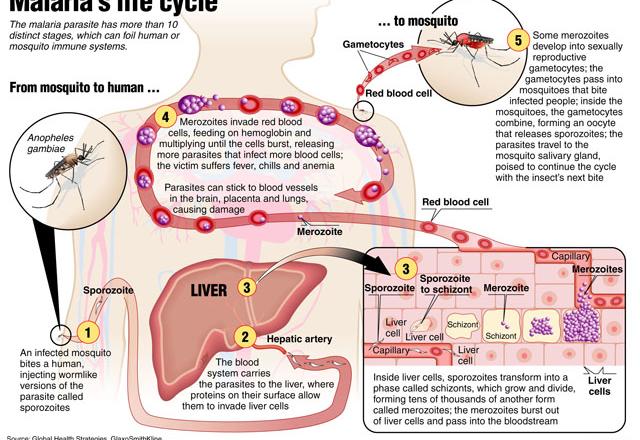You are here
Global warming amplifying malaria risk — study
By AFP - Mar 08,2014 - Last updated at Mar 08,2014

PARIS — Global warming will expose millions more people to malaria as parasite-bearing mosquitoes move to higher altitudes, according to new research into the health perils from climate change.
Tropical highland areas in Africa, Asia and central and southern America are particularly at risk, according to a study published in the US journal Science recently.
Malaria, which killed an estimated 620,000 people in 2012, is among a host of diseases that researchers warn will spread more easily thanks to global warming.
For Ethiopia alone, “a one-degree-Celsius increase in temperature will lift the area where malaria can occur by 150 metres,” Menno Bouma of the London School of Hygiene and Tropical Medicine told AFP.
“In this band, there live about six to nine million people. These people will be additionally affected, but also people that live a bit lower, where malaria is present but at a lower level. For those people, the malaria intensity is likely to increase.”
Bouma and a team scrutinised malaria records from the highland regions of Colombia from 1990 to 2005 and Ethiopia from 1993 to 2005.
They found that in warmer years, people living at higher elevations experienced more malaria infections than they do in cooler years.
“This is indisputable evidence of a climate effect,” said University of Michigan ecologist Mercedes Pascual.
“The main implication is that with warmer temperatures, we expect to see a higher number of people exposed to the risk of malaria in tropical highland areas like these.”
People in areas previously unaffected by malaria never built up immunity, and will be particularly vulnerable.
Bouma said other tropical highland areas surrounded by malaria-endemic regions “are likely to be affected by a similar principle” as found in the study.
These included parts of Peru, Ecuador, Kenya, Uganda, Tanzania, Madagascar, Pakistan, India, Nepal and Papua New Guinea.
But Bouma said the study did not automatically imply a higher malaria risk for all countries at higher altitudes, as a special mix of climate and socio-economic conditions had to be present.
Transferred by a parasite transmitted through mosquito bites, malaria can be prevented with nets, insecticides and medicines.
Symptoms include fever, headache and vomiting. If left untreated, it can kill by disrupting the blood supply to vital organs.
Malaria is not the only threat to human health receiving a boost from global warming.
“Many of the major killers such as diarrhoeal diseases, malnutrition, malaria and dengue are highly climate-sensitive and are expected to worsen as the climate changes,” according to the World Health Organisation.
Dengue, which is a mosquito-borne disease like malaria, is spreading at an alarming rate and had “epidemic potential”, according to the UN agency.
It causes high fever, headaches, itching and joint pains, and can lead to haemorrhaging and death.
Scientists warned in 2012 that the warmer, wetter climate in northwestern Europe and the Balkans was becoming suitable for the Asian tiger mosquito which spreads dengue, West Nile fever, yellow fever and chikungunya, an East African disease which attacks the joints.
The mosquito is an invasive species first spotted in Europe in Albania in 1979 — possibly having arrived there in a shipment of goods from China, investigators believe.
The health risks from climate change loom large in an upcoming report by the UN’s Nobel-winning Intergovernmental Panel on Climate Change (IPCC).
A draft document to be vetted at an IPCC meeting in Yokohama, Japan, at the end of March, warns that climate change this century “will lead to increases in ill-health in many regions”.
“Examples include greater likelihood of injury, disease and death due to more intense heat waves and fires; increased likelihood of under-nutrition resulting from diminished food production in poor regions’ risk from lost work capacity and reduced labour productivity in vulnerable populations; and increased risks from food- and water-borne diseases,” it says.
Related Articles
AMMAN — In addition to its environmental affects, experts stress that climate change also has a negative impact on human health.
HRH Princess Muna, WHO patron for nursing and midwifery in the Eastern Mediterranean region, on Monday attended a ceremony marking World Health Day, this year held under the theme “Small bite, big threat”.
LONDON — As the world focuses on Zika’s rapid advance in the Americas, experts warn the virus that originated in Africa is just one of

















